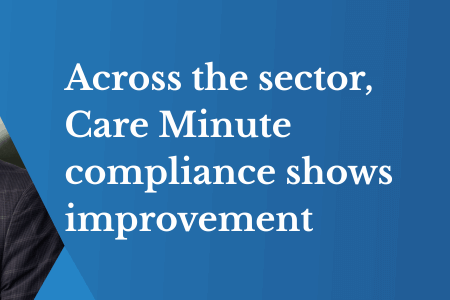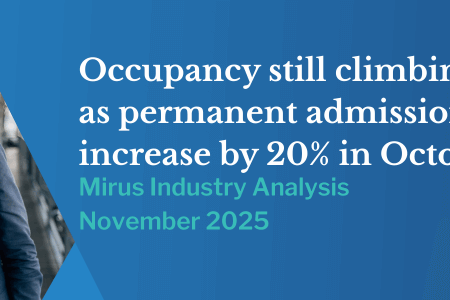How the updated Personal Care Worker definition affects Care Minutes
May 22, 2025 | Care Minutes

By Chris Lyons, Senior Consultant
The Department of Health and Aged Care recently clarified the definition of a Personal Care Worker (PCW) for care minute reporting. This clarification, shared during the 1 May 2025 departmental webinar, provides important guidance on how providers should classify staff time for inclusion in care minutes—and will influence both compliance and funding outcomes.
Below is a summary of the key changes, how to interpret them in the context of your operations, and how you can begin preparing with confidence.
What’s changed in the PCW definition?
The Department has refined its interpretation of “primary responsibility” in relation to PCWs, as outlined in the webinar slides (page 16). Previously, employees who divided their time across personal care, lifestyle support, and food services may have still contributed to care minute totals. Under the revised guidance, this is no longer the case.
Key points:
- Personal care must now be the primary responsibility of the employee for their time to be counted toward care minutes.
- These services must be delivered under the supervision of a Registered Nurse (RN) or Enrolled Nurse (EN).
- Personal care includes support with daily living, hygiene, and treatment-related activities—but not social and emotional support, for the purpose of defining a PCW’s role.
Examples shared in the webinar included:
- Melanie, who spends 80% of her time on personal care and 20% on social and emotional support, qualifies as a PCW. All of her time delivering care to residents—including social and emotional support—counts toward care minutes.
- Paul, who spends most of his time on kitchen duties and only 10% on personal care, does not qualify as a PCW, and his time should not be included in care minute totals.
This change aims to ensure that only staff predominantly engaged in personal care contribute to care minute targets—helping to better align funding with actual care delivery.
Social and emotional support
There has been recent clarification regarding the treatment of social and emotional support within care minute reporting. The Department has now specified that social and emotional care is not considered a personal care service for the purpose of calculating care minutes. As such, it is no longer included unless it is delivered as part of a broader direct care activity by a worker who meets the definition of a PCW, RN or EN.
This marks a change from earlier guidance, where social and emotional support delivered by eligible care staff could be counted. Providers should now ensure that documentation and workforce allocations reflect this shift. Activities focused solely on companionship or one-on-one social engagement should not be reported as care minutes unless they occur in conjunction with other personal care tasks.
The 50% threshold
OTo assist providers in determining who qualifies as a PCW under the revised definition, we recommend applying a 50% threshold. If a staff member spends more than half of their time on personal care, they are likely to meet the criteria for inclusion in care minute reporting.
For example:
- A team member who spends 60% of their time assisting with hygiene and dressing, and 40% on lifestyle activities, would likely qualify as a PCW.
- In contrast, someone spending only 30% of their time on personal care would not meet the threshold, and their time should be excluded.
This threshold provides a consistent and defensible framework to support internal decision-making and reporting accuracy.
Next steps
With this clarification, now is the time to review your workforce classifications, rostering, and reporting practices. Consider whether:
- Your PCW roles are clearly defined and focused on personal care delivery
- Your documentation supports the classification of staff roles in line with the updated guidance
- Your time and attendance systems reflect primary responsibilities accurately.
Why this matters
The clarification of the PCW definition forms part of broader reforms that will impact funding. From April 2026, non-specialised aged care homes in MM1 areas will see changes to the Base Care Tariff and the introduction of a new performance-linked supplement.
A $31.92 reduction in the daily Base Care Tariff will be offset by a performance-based supplement tied to the delivery of care minutes. Accurate classification of PCW time will be essential to maintaining full funding and meeting compliance obligations.
How we can support you
If you’re unsure how this clarification affects your service, or need support in reviewing your care minute reporting practices, we’re here to help. Our Care Minute Policy Review is designed to help providers gain clarity and confidence in their reporting practices.
You’ll gain:
- External validation that care minute assumptions are consistent with industry best practice by benchmarking with over 256 facilities.
- Providing your business with confidence that the baseline care minutes are aligned with the Department’s care minute guidelines.
- Identifying potential gaps between current and compliant levels of direct care allocations.
- Insight into the impact of that changes in care minute allocations will have on the next QFR.
- Other related recommendations on areas to consider for improvement, including the revision or development of an existing care minute policy.
With experience supporting more than 100 providers, we’re well positioned to help your organisation navigate these changes and reduce the risk of underreporting or misclassification.


